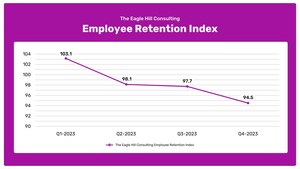ARLINGTON, Va., June 29, 2021 /PRNewswire/ -- A new national employee survey from Eagle Hill Consulting finds that 64 percent of U.S. workers believe that employee experience directly impacts their ability to serve customers. Yet, less than half (38 percent) say that their organization places a great deal of importance on employee experience and satisfaction.
This research comes as the American Customer Satisfaction Index is at its lowest point since 2005, and citizen satisfaction with federal government services is at its lowest point since 2015.
The Eagle Hill Consulting Employee Experience Survey 2021 was conducted by Ipsos in January, 2021, and it included 1,003 respondents from a random sample of employees across the U.S. on a range of employee experience aspects, including technology, diversity, employee engagement and customer service. Read more in Are Customer Experience Problems Coming in Through the Employee Entrance?
"The direct path to creating a high quality customer experience is improving the employee experience," says Melissa Jezior, president and chief executive officer of Eagle Hill Consulting. "Companies can have terrific products, but customer experience will make or break customer loyalty. And even with the big tech investments organizations have made to improve customer experience—enhancing self-service options, enriching websites, and offering greater channel flexibility—it cannot replace the human relationships that are at the core of customer experience. The bottom line: happy employees lead to happy customers."
The research also finds that:
- Employees surveyed indicate that their organizations both weighted customer experience as more important to delivering the organizational mission (57 percent) and took greater action to improve customer experience (55 percent) than say their organization considered employee experience more important (27 percent) and took greater action to improve it (25 percent).
- A majority of respondents agree that their feelings about their day-to-day work experience—negative or positive—impact their productivity (70 percent) and their ability to do meaningful work (69 percent).
- Dissatisfied employees are more than three times more likely than satisfied ones (31 percent compared to 10 percent) to say their feelings about day-to-day work experience negatively impact their productivity, and more than two times more likely (21 percent compared to nine percent) to say their feelings negatively impact their ability to serve customers.
- Dissatisfied employees say they are more than two and a half times more likely (13 percent compared to five percent) to say they do not provide excellent customer service; and twice as likely (nine percent compared to five percent) to say they do not deliver quality outcomes.
- 95 percent of respondents agree that they deliver quality outcomes, while 94 percent agree they provide excellent customer service and are productive at work. But employees feel much less confident in their teammates' abilities and performance, with 19 percent saying that having to do the work of underperforming colleagues is their top source of frustration at work.
- When asked about the factors valued most at work, respondents were more likely to rank individualistic factors in the top two than they were to rank factors related to teamwork. For example, 41 percent rated work-life balance as a top-two factor, followed by purposeful work (32 percent) and productive work (30 percent). In contrast, only 12 percent of respondents ranked authentic relationships with team members and team collaboration among their top two most valued factors at work.
- A full quarter of respondents (25 percent) disagree that they feel connected to their colleagues.
- Less than half of employees (41 percent) believe their manager/supervisor demonstrates care/concern about their interactions and relationships with team members.
- Employee attitudes on technology are mixed. While 67 percent say technology improves their ability to serve customers, 22 percent say technology actually makes it harder for them to do their work. Overall, more than one third of respondents (35 percent) say technology frustrates them.
Recommendations for improving both the employee and customer experience are available here.
Eagle Hill Consulting LLC is a woman-owned business that provides unconventional management consulting services in the areas of Strategy & Performance, Talent, and Change. The company's expertise in delivering innovative solutions to unique challenges spans across the private, public, and nonprofit sectors, from financial services to healthcare to media & entertainment. Eagle Hill has offices in the Washington, D.C. metropolitan area, Boston, MA and Seattle, WA. More information is available at www.eaglehillconsulting.com.
SOURCE Eagle Hill Consulting

Related Links
WANT YOUR COMPANY'S NEWS FEATURED ON PRNEWSWIRE.COM?
Newsrooms &
Influencers
Digital Media
Outlets
Journalists
Opted In




Share this article